
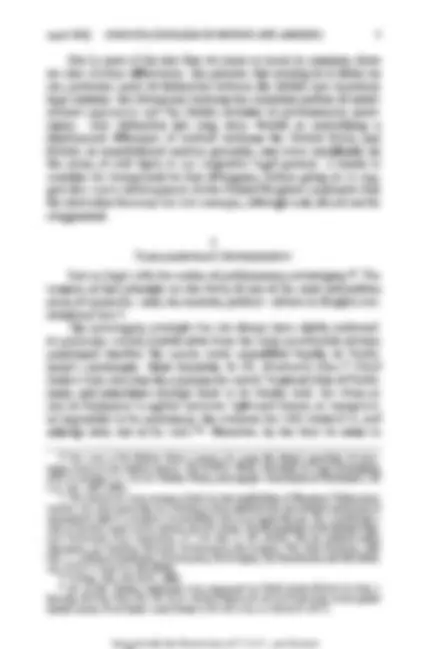
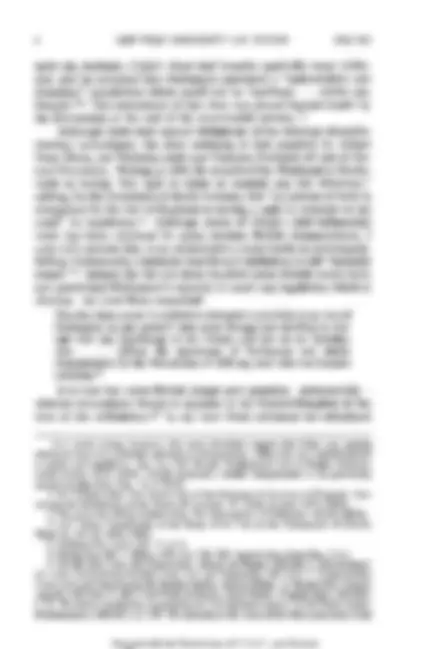
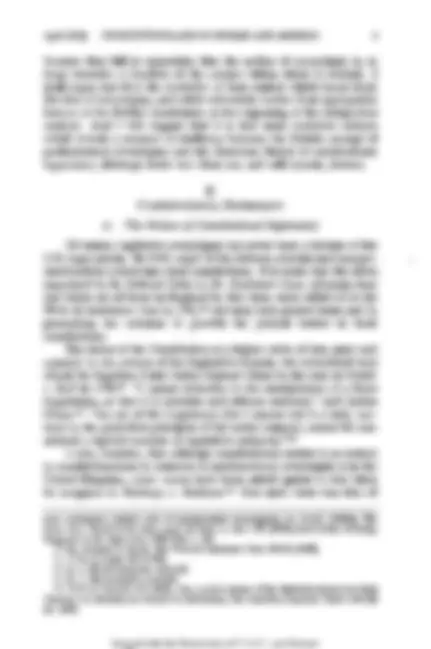
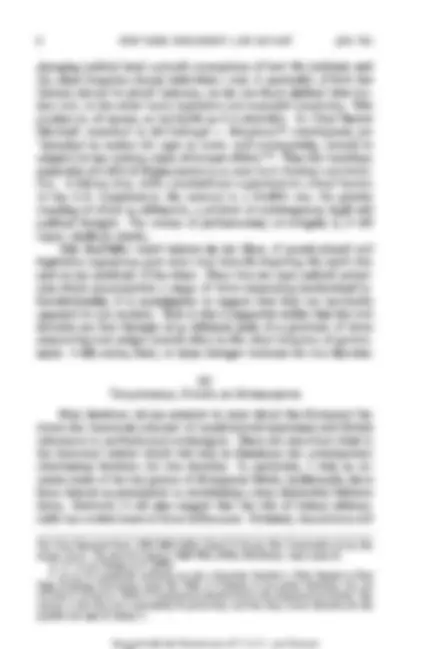
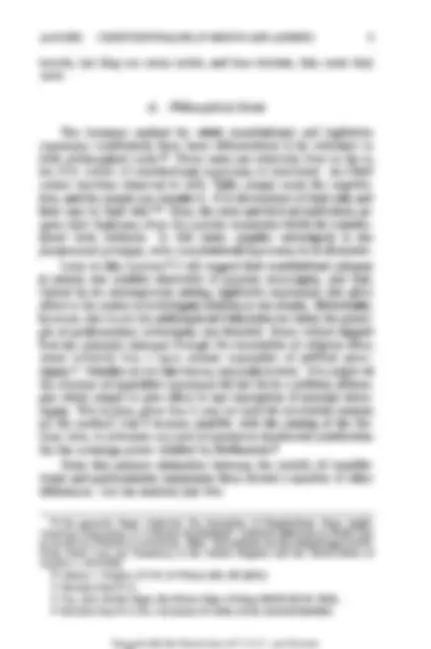
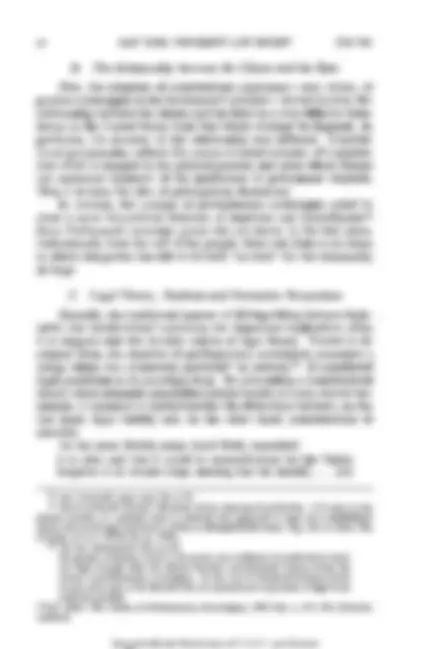
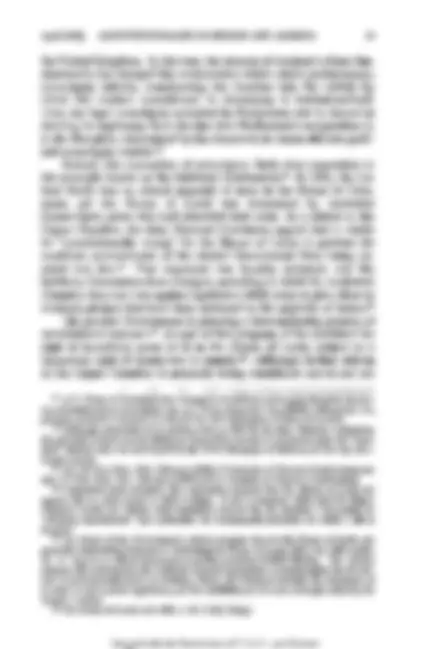
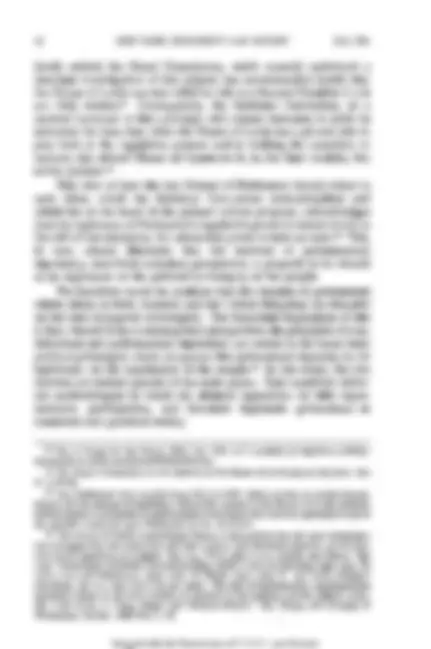
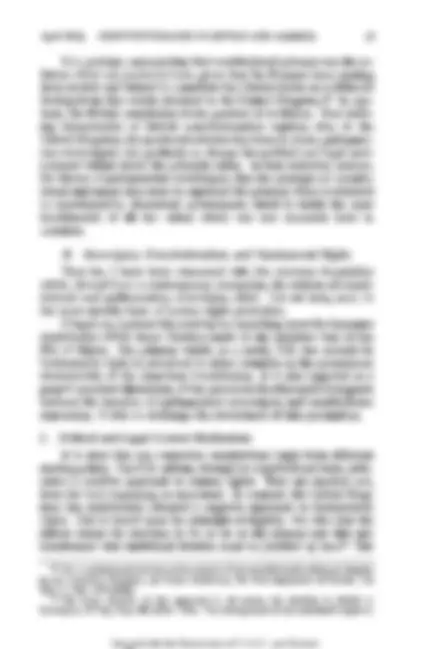
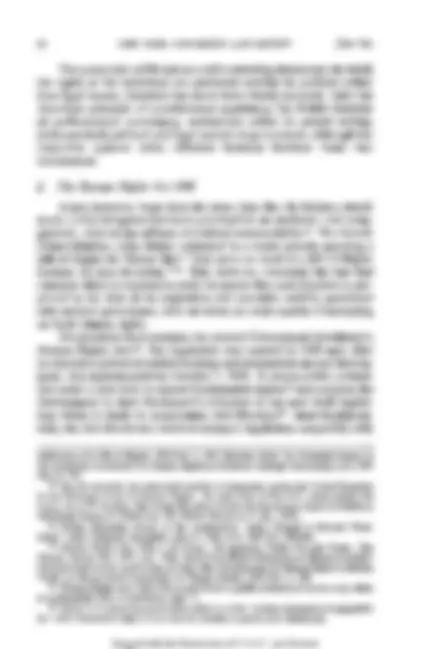
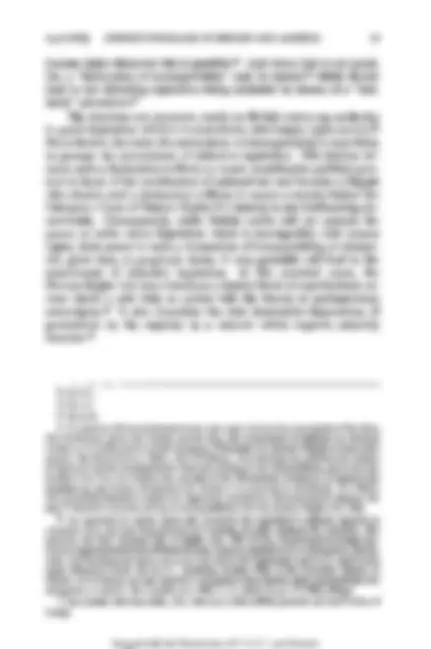
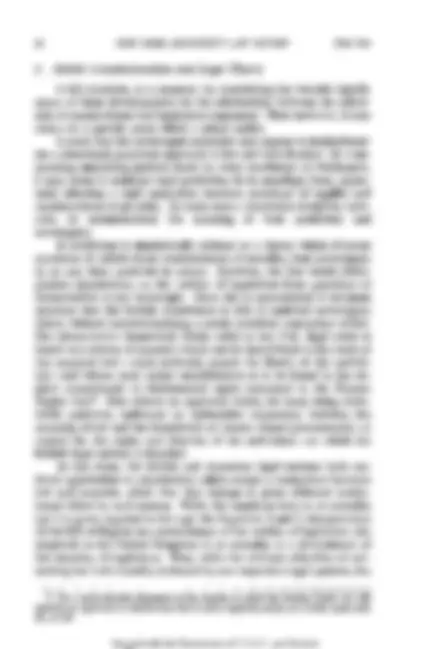
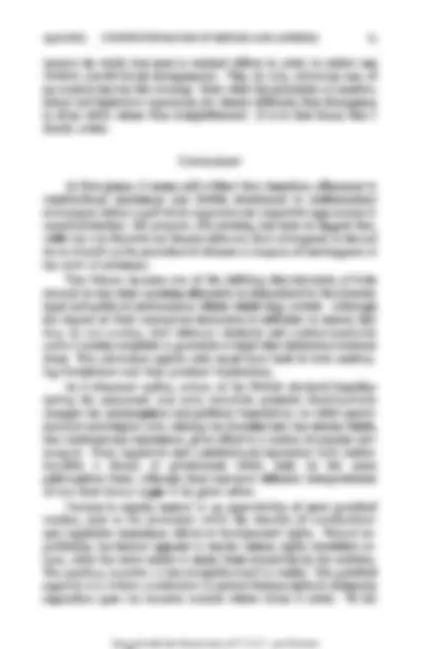
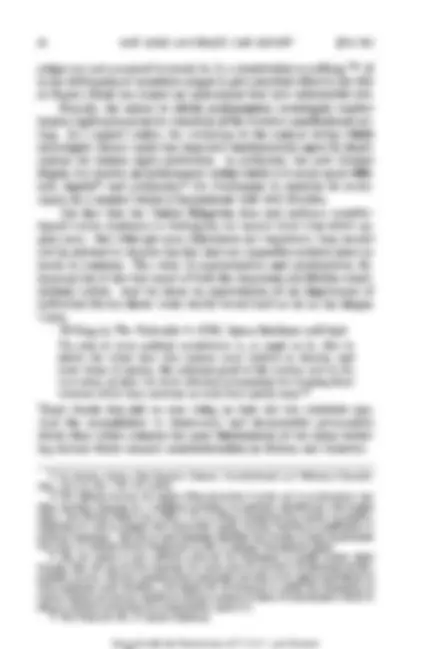


Study with the several resources on Docsity

Earn points by helping other students or get them with a premium plan


Prepare for your exams
Study with the several resources on Docsity

Earn points to download
Earn points by helping other students or get them with a premium plan
Community
Ask the community for help and clear up your study doubts
Discover the best universities in your country according to Docsity users
Free resources
Download our free guides on studying techniques, anxiety management strategies, and thesis advice from Docsity tutors
The differences and similarities between the British concept of parliamentary sovereignty and the American theory of constitutional supremacy. The author discusses the historical context, criticisms, and implications of both concepts, as well as their evolution in modern constitutionalism.
Typology: Study notes
1 / 22

This page cannot be seen from the preview
Don't miss anything!















VOLUME 76 APRIL 2001 NumBER 1
LORD IRvu-m OF LAmG*
In this James Madison Lectur4 the Lord Chancellor, Lord Irvine of Lairg, ob- serves that the American system of constitutional supremacy and judicial review sharesmany common features with die British unvritten constitution'semphasis on parliamentarysovereignty widout judicial review. While the nvo systems are often described as polar opposites, Lord Irvine argues that both operate in a context of democraticgovernment and translatesubstantiallyidentical commitments to popu- lar sovereignty into distinc4 yet related, approachesto constitutionalism.
INTRODUCTION "The American Constitutions," said Thomas Paine, "were to lib- erty, what a grammar is to language: they define its parts of speech, and practically construct them into syntax."^1 The central role which was played by James Madison, whose memory this Lecture commem- orates, in the construction of the U.S. Constitution is too well known to require elaboration this evening. It suffices to note that, as one American commentator recently put it, Madison's championing of the amendment of the Constitution was an accomplishment which "enti- ties him to be remembered as father of the Bill of Rights even more than as^ father^ of^ the^ Constitution.^
' 2
***** Lord High Chancellor, United Kingdom of Great Britain and Northern Ireland. This is the revised text of the thirty-first annual James Madison Lecture on Constitutional Law delivered at New York University School of Law on October 17, 2000. 1 Thomas Paine, The Rights of Man (1791), reprinted in Two Classics of the French Revolution 270, 334 (1989). 2 Leonard W. Levy, Origins of the Bill of Rights 34 (1999). For background informa- tion on the inception of the U.S. Bill of Rights, see generally id. at 1-43.
1
NEW YORK UNIVERSITY LAW REVIEW
In the speech which he made to Congress introducing the Bill of Rights, 3 Madison acknowledged that "paper barriers" have their limi- tations. But he also observed that, because "they have a tendency to impress some degree of respect for them, to establish the public opin- ion in their favor, and^ rouse^ the^ attention^ of^ the^ whole^ community," they are an important means by which "to control the majority from those acts to which they might be otherwise inclined."'4^ By thus recog- nizing the potential of a Bill of Rights, Madison effected, for America, the constitutionalization of liberty-a process which, in the ensuing two hundred years, many other legal systems rightly have emulated. I hesitate, however, to categorize the United Kingdom simply as one of those "other" jurisdictions. Of course, ever since Indepen- dence, there has existed a formal separation between our two systems. But the linkages of legal culture which connect them have proved more resilient. That is hardly surprising, not least because of the shared common law foundation on which modem English and Ameri- can law both rest.^5 More specifically, many of the rights which were enshrined first in the state constitutions and, later, in the federal Con- stitution share much in common (^) with the values articulated in English constitutional texts. For instance, section 39 of the Magna Carta, which provided that "[n]o freeman shall be... imprisoned... except by the lawful judg- ment of his peers or by the law of the land," 6 was clearly a forerunner of the Due Process Clause in the U.S. Bill of Rights. 7 There are equally self-evident parallels between the provision in the 1689 Bill of Rights requiring "that the freedom of speech.., ought not to be im- peached or questioned ' 8^ and the guarantee enshrined in the U.S. Constitution's First Amendment. More generally, the writings of En- glish philosophers had a fundamental impact on the theory of govern- ment which took root in America, as the relationship between the Declaration of Independence and the work of John Locke illustrates. 9
3 For the full text of Madison's celebrated speech, see 5 The Roots of the Bill (^) of Rights 1016 (Bernard Schwartz ed., 1971). 4 Id. (^) at 1030. 5 See generally Lord Irvine of Lairg, The Common Origins of English and American Law, Inner Temple Lecture to the Inner Temple, London (Mar. 22, 2000) (transcript avail- able at http://www.open.gov.uk/lcd/speeches/2000/2000fr.htm). 6 Magna Carta § 39 (1215), reprinted in 1 The Roots of the Bill of Rights, supra note 3, at 8, 12. 7 U.S. Const. (^) amend. V; see also id. amend. XIV. 8 Bill of Rights (1689), reprinted in 1 The Roots of the Bill of Rights, supra note 3, at 41, 43. 9 See especially John Locke, The Second Treatise of (^) Civil Government (J.W. Gough ed., Basil Blackwell 1946) (1690).
[Vol. 76:
NEW YORK UNIVERSITY LAW REVIEW
write his Institutes, Coke's views had become markedly more ortho- dox, and he accepted that Parliament possessed a "transcendent and abundant" jurisdiction which could not be "confined... within any bounds."'1 4^ The correctness of that view was placed beyond doubt by the Revolution at the end of the seventeenth century.^15 Although there exist myriad definitions of the doctrine of parlia- mentary sovereignty, the most enduring is that supplied by Albert Venn Dicey, the Victorian jurist and Vinerian Professor of Law at Ox- ford University. Writing in 1885, he described the Westminster Parlia- ment as having "the right to make or unmake any law whatever," adding, for the avoidance of doubt it seems, that "no person or body is recognized by the law of England as having a right to override (^) or set aside" its legislation. 16 Although much of Dicey's (still influential) work has been criticized by many modern British commentators, I note with interest that, in an authoritative recent book on sovereignty, Jeffrey Goldsworthy concludes that Dicey's definition is still "basically sound."' 7 Indeed, for the last three hundred years British courts have not questioned Parliament's capacity to enact any legislation which it chooses. As Lord Reid remarked:
The idea that a court is entitled to disregard a provision in an Act of Parliament on any ground must seem strange and startling to any- one with any knowledge of the history and law of our constitu- tion .... [S]ince the supremacy of Parliament was finally demonstrated by the Revolution of 1688 any such idea has become obsolete. 18 It is true that some British judges now question-extracurially- whether sovereignty theory is apposite to the United Kingdom at the turn of the millennium. 19 In my view these criticisms are misplaced
It is worth noting, however, that some historians suggest that Coke was arguing merely in favor of a particular approach to interpretation, rather than for a judicial power to quash such legislation. See, e.g., J.W. Gough, Fundamental Law in English Constitu- tional History 40-41 (1955). Gough attributes a similar interpretation to the previously quoted passage from Day. Id. at 38-39. 14 Sir Edward Coke, The Fourth Part of the Institutes of the Laws of England: Con- cerning the Jurisdiction of the Courts 36 (London, W. Clarke & Sons 1817) (1644), 15 See generally Jeffrey Goldsworthy, The Sovereignty of Parliament 142-220 (1999). 16 A.V. Dicey, Introduction to the Study of the Law of the Constitution 40 (E.C.S. Wade ed., 9th ed. 1956) (1885). 17 Goldsworthy, supra note 15, at 11. 18 British Rys. Bd. v. Pickin, 1974 A.C. 765, 782 (appeal taken from Eng. C.A.). 19 See Sir John Laws, The Constitution: Morals and Rights, 1996 Pub. L. 622 [hereinaf- ter Laws, Constitution]; Sir John Laws, Law and Democracy, 1995 Pub. L. 72 [hereinafter Laws, Law and Democracy]; Sir Stephen Sedley, Human Rights: A Twenty-First Century Agenda, 1995 Pub. L. 386; Lord Woolf of Barnes, Droit Public-English Style, 1995 Pub. L. 57. For similar sentiments, expressed in the New Zealand context, see Sir Robin Cooke, Fundamentals, 1988 N.Z. L.J. 158. For rebuttals of the views of Sir John Laws (who is the
[Vol. 76:
April 2001] CONSTITUTIONALISM IN BRITAIN AND AMERICA (^) 5
because (^) they fail to appreciate that the notion of sovereignty is, in large measure, a function of the context within which it subsists. I shall argue that it is the evolution of that context which keeps fresh the idea of sovereignty, and which ultimately renders it an appropriate feature of the British constitution at the beginning of the twenty-first century. And I will suggest that it is that same evolutive context which reveals a measure of similarity between the British concept of parliamentary sovereignty and the American theory of constitutional supremacy, although those two ideas are, and will remain, distinct.
CONSTITUTIONAL SUPREMACY
A. The Notion of ConstitutionalSupremacy
Of course, legislative sovereignty has never been a feature of the U.S. legal system. By 1787, eight of the thirteen colonies had incorpo- rated judicial review into their constitutions. It is ironic that the views expressed by Sir Edward Coke in Dr. Bonham's Case, although they had fallen out of favor in England by that time, were relied on in the Writs of Assistance Case in 17610 and may have played some part in persuading the colonies to provide for judicial review in their constitutions. The status of the Constitution as a higher order of law, prior and superior to the powers of the legislative branch, was articulated very clearly by Supreme Court Justice Samuel Chase in the case of Calder v. Bull in 1798 1 "I cannot subscribe to the (^) omnipotence of a State Legislature, or that it is absolute and without controul," said Justice Chase. 22 "An act of the Legislature (^) (for I cannot call it a law), con- trary to the (^) great first principles of the social compact, cannot be con- sidered a rightful exercise of^ legislative^ authority."'^3 I note, however, that although constitutional review is as central to constitutionalism in America as parliamentary sovereignty is in the United Kingdom, some voices have been raised against it ever since its inception in Marbury v. Madison.^24 One such voice was that of
most enthusiastic judicial critic of parliamentary sovereignty), see J.A.G. Grifiith, The Brave New World of Sir John Laws, 63 Mod. L Rev. 159 (2000); Lord Irvine of Lairg, Response to Sir John Laws, 1996 Pub. L 636. 20 See Maurice H. Smith, The Writs of Assistance Case 359-62 (1978). 21 3 U.S. (3 Dall.) 386 (1798). 22 Id. at 387-88 (^) (emphasis omitted). 23 Id. at 388 (emphasis omitted). 24 5 U.S. (1 Cranch) 137 (1803). For a useful account of (^) the historical context in vihich Marbury was decided, see Robert G. McCloskey, The American Supreme Court 1-34 (2d ed. 1994).
April 2001] CONSTITUTIONALISM IN BRITAIN AND AMERICA 7
The fact that this same debate is ongoing within both the British and American legal systems points towards an important fact which is sometimes overlooked. Constitutional supremacy and parliamentary sovereignty are often perceived as concepts which are polemically op- posed to one another, given that the former limits legislative (^) power and entrenches fundamental rights, while the latter embraces formally unlimited power and eschews the entrenchment of human rights. However, the better (^) view is that they represent two different parts of a continuum, each reflecting differing views about how the judiciary and the other institutions of government ought to interrelate. This conceptualization follows (in part) from the fact that the no- tions of constitutional and legislative supremacy are themselves elas- tic. For instance, there exists a spectrum of opinions about precisely what constitutional supremacy ought (^) to mean in the U.S. context. Al- though it is firmly settled that the U.S. Constitution does amount to a superior set of laws which are judicially enforceable,^30 this still leaves great scope for flexibility. 31 For instance, by 1858, the Supreme Court had held only two pieces of federal legislation to be unconstitutionalP 2 The record of the Court in those early years contrasts sharply with the much more activist approach which was adopted by, for instance, the Warren Court^33 Such variation, over time, of the level of activism 34 which is evi- dent in the (^) Supreme Court's decisions reflects (among other things) 35
30 Academic debate notwithstanding. See supra note 27. 31 Perhaps the most vivid illustration of this flexibility (^) is to be found in the Supreme Court's case law on the constitutionality of racial segregation. As is well known, the Court held in Plessy v. Ferguson, 163 U.S. 537 (1896), that the "separate but equal" policy was not incompatible with the Constitution. However, in the celebrated case of Brown v. Board of Education, 347 U.S. 483 (1954), the Court came to the opposite conclusion. Chief Justice Warren concluded that the policy deprived the plaintiffs, and "others similarly situ- ated," of the "equal protection of the laws guaranteed by the Fourteenth Amendment." Id. at 495. 32 See Dred Scott v. Sandford, 60 U.S. (19 How.) 393 (1857); Marbury v. Madison, 5 U.S. (1 Cranch) 137 (1803). 33 For a useful survey of historical and quantitative research on the judicial policies of the U.S. Supreme Court, see David G. Barnum, The Supreme Court and American De- mocracy 74-105 (1993). 34 A discussion of the various meanings ascribed to the term "activism" can be found in Bradley C. Canon, Defining the Dimensions of Judicial Activism, 66 Judicature 236 (1983). For a comparative analysis of the notion of activism in the fundamental rights context, see Lord Irvine of Lairg, Activism and Restraint: Human Rights and the Interpretative Pro- cess, 1999 Eur. Hum. Rts. L. Rev. 350. 35 Of course, changes in the decisionmaking trends of the Supreme Court are also influ- enced by a large number of other factors. The study of such matters forms a discrete discipline in American legal scholarship and is beyond the scope of this Lecture. For anal- ysis of the influences which shaped decisionmaking in the Supreme Court (^) during its first two centuries, see, for example, David P. Currie, The Constitution in the Supreme Court:
NEW YORK UNIVERSITY LAW REVIEW
changing judicial (and societal) conceptions of how the judiciary and the other branches should interrelate-and, in particular, of how the balance should be struck between, on the one hand, judicial interven- tion and, on the other hand, legislative and executive autonomy. This position is, of course, as inevitable as it is desirable. As (^) Chief Justice Marshall remarked in McCullough v. Maryland,^36 constitutions are "intended to endure for ages to come, and consequently, [must] be adapted to the various crises of human affairs. '37^ Thus the necessary generality of a Bill of Rights makes it at once both timeless and evolu- tive. It follows that, while constitutional supremacy is a fixed feature of the U.S. Constitution, the concept is a (^) flexible one, the precise meaning of which is, ultimately, a product of contemporary legal and political thought. The notion of parliamentary sovereignty is, I will argue, similarly elastic. This flexibility which inheres in the ideas of constitutional and legislative supremacy goes some way towards dispelling the myth that each is the antithesis of the other. Since they are each catholic princi- ples which accommodate a range of views concerning institutional in- terrelationship, it is meaningless to suggest that they are inevitably opposed to one another. That is why I suggested earlier that the two theories are best thought of as different parts of a spectrum of views concerning how judges should relate to the other branches of govern- ment. I will return, later, to these linkages between the two theories.
TRADITIONAL PoiNTs OF DIVERGENCE
First, however, let me consider in more detail the divergence be- tween the American principle of constitutional supremacy and British adherence to parliamentary sovereignty. There are important clues in the historical context which will help to illuminate the contemporary relationship between the two theories. In particular, I wish to ex- amine some of the key points of divergence which, traditionally, have been treated as preeminent in establishing a clear distinction between them. However, (^) I will also suggest that the tide of history substan- tially has eroded some of those differences. Certainly, distinctions still
The First Hundred Years 1789-1888 (1985); David P. Currie, (^) The Constitution in the Su- preme Court: The Second Century 1888-1986 (1990); McCloskey, supra note 24. 36 17 U.S. (4 Wheat.) 315 (1819). 37 Id. at 413 (emphasis omitted); see also Alexander Hamilton, Third Speech at New York Ratifying Convention (June 28, 1788), in 5 Papers of Alexander Hamilton 114, 118 (Harold C. Syrett ed., 1962) ("Constitutions should consist only of general provisions: The reason is, that they must necessarily be permanent, and (^) that they cannot calculate for the possible changes of things.").
[Vol. 76:
NEW YORK UNIVERSITY LAW REVIEW
B. The Relationship Between the Citizen and the State First, the adoption of constitutional supremacy-and, hence, of popular sovereignty as the fundamental principle-served to place the relationship between the citizen and the state on a very (^) different foun- dation in the United States from that which obtained in England. In particular, the dynamic of the relationship was different. Constitu- tional paramountcy reflects the notion of social compact, of a popula- tion which is engaged in the political process, and upon whose license the continued existence of the institutions of government depends. Thus it invokes the idea of participatory democracy. In contrast, the concept of parliamentary sovereignty called to mind a^ more^ hierarchical^ structure^ of^ superiors^ and^ subordinates.^
43
Since Parliament's sovereign power did not derive, in the first place, institutionally from the will of the people, there was little or no sense in which that power was felt to be held "on trust" for the community at large.
C. Legal Theory: Positivist and Normative Perspectives Secondly, the traditional manner of distinguishing between legis- lative and constitutional supremacy has important implications when it is mapped onto the broader canvas of legal theory. Viewed in its original form, the doctrine of parliamentary sovereignty presented a visage which was relentlessly positivist" in outlook. 45 It constituted legal positivism in its paradigm form. By articulating a constitutional theory which demands unqualified judicial loyalty to every Act of Par- liament, it appeared to institutionalize the distinction between, on the one hand, legal validity and, on the other hand, considerations of morality. As the great British judge, Lord Reid, remarked: It is often said that it would be unconstitutional for the United Kingdom to do certain things, meaning that the moral[ ] ... [or]
43 See Cotterrell, (^) supra note 38, at 39. 44 Space precludes detailed discussion of the meaning of positivism. It is used, in the present context, in a general sense to describe that approach to legal and constitutional theory that treats legal and moral validity as distinguishable issues. E.g., H.L.A. Hart, The Concept of Law 185-93 (2d ed. 1994). 45 As one commentator has noted: No greater testimony exists to the power and resilience of positivism in mod- em legal thought than the debate between constitutional lawyers about the nature of parliamentary sovereignty. At the root of almost all analyses of the nature and scope of the doctrine lies an unquestioned separation of legal from political principle. T.R.S. Allan, The Limits of Parliamentary Sovereignty, 1985 Pub. L. 614, 614 (footnote omitted).
[Vol. 76:
April 2001] CONSTITUTIONALISM IN BRITAIN AND AMERICA 11
other reasons against doing them are so strong that most people would regard it as highly improper if Parliament did these things. But... [i]f Parliament chose to do any of them the courts could not hold the Act... invalid. 46 Viewed in this way, the doctrine of parliamentary sovereignty turns the pure theory of legal positivism (^) into legal reality. Constitutional supremacy, of course, is not amenable to such analysis. The fact that the Bill of Rights enjoys the status of funda- mental law precludes a purely positivist approach to adjudication in America. Here, it is impossible to divorce legal validity from consid- erations of political and social morality. The existence of an en- trenched Constitution enjoins an approach which embraces an ineluctable connection between questions of law and questions of morality. Looked at in this manner, the divide between positivist and nor- mative models of adjudication underscores still further the perceived distinction between the notions of constitutional and legislative supremacy.
So much for traditionalperceptions. What of present realities? I wish to demonstrate, in the time which remains, that although the pic- ture I have just painted once may have described accurately the dis- tinction between our two constitutional systems, it is now nothing more than an outdated caricature. In particular, I shall return to the idea which I sketched earlier: that sovereignty, meaningless in ab- stract terms, (^) is a creature of contemporary political and legal context. I will argue that, once this fundamental point is appreciated, it be- comes apparent that the distinction between legislative and constitu- tional supremacy is real, but markedly more subtle than it once was. Let me consider some specific features of modem British consti- tutionalism that fundamentally have changed the context within which the notion of parliamentary sovereignty must be understood and which, as a result, have (^) important implications for any comparison of the principles of constitutional and legislative supremacy.
A. The Modem Basis of ParliamentarySovereignty As a matter of legal history, the philosophical foundations on which those two concepts stand have been viewed as the fundamental
46 Madzimbamuto v. Lardner-Burke, [1969] 1 A.. 645, 723 (P.C. 1968) (appeal taken from S. Rhodesia).
April 2001] CONSTITUTIONALISM IN BRITAIN AND AMERICA 13
the United Kingdom. In this way, the process of electoral reform fun- damentally has changed the environment within which parliamentary sovereignty subsists, transforming the doctrine into the vehicle by which the modem commitment to democracy is institutionalized. Thus, the legal sovereignty exercised by Parliament now is viewed as deriving its legitimacy from the fact that Parliament's composition is, in the first place, determined by the electorate in whom ultimate polit- ical sovereignty resides.^55 Indeed, this conception of sovereignty finds clear expression in the principle known as the Salisbury Convention. 56 In 1945, the La- bour Party won an overall majority of seats (^) in the House of Com- mons, yet the House of Lords was dominated by unelected Conservative peers who had inherited their seats. In a debate in the Upper Chamber, the then Viscount Cranbome argued that it would be "constitutionally wrong" for the House of Lords to prevent the manifesto commitments of the elected Government from being en- acted into law.^57 That argument was broadly accepted, and the Salisbury Convention thus emerged, according to which the unelected Chamber does not vote against legislation which seeks to give effect to electoral pledges that have been endorsed by the majority of voters.^58 The present Government is pursuing a thoroughgoing process of constitutional renewal. 59 As part of that program, it has abolished the right of hereditary peers to sit in the House of Lords, subject to a temporary right of ninety-two to remain. 60 Although further reform of the Upper Chamber is presently being considered and is not yet
55 A.V. Dicey acknowledged the emergence of political sovereignty alongside the the- ory of parliamentary sovereignty, see, e.g., Dicey, supra note 16, at 82-85, although he wvas, perhaps, somewhat reluctant to embrace the full implications of their interaction. 56 Although enunciated in its modem form in 1945 by the then Viscount Cranbome, the principle is known as the Salisbury Convention because it is founded upon the "man- date" doctrine that was developed by the Third Marquess of Salisbury in the late nine- teenth century. 57 See 137 Parl.Deb., H.L (5th ser.) (1945) 47 (remarks of Viscount Cranboume); see also 137 ParL Deb., ILL. (5th ser.) (1945) 613-14 (remarks of Viscount Cranboume). 5 Formulated more precisely, the Convention requires that the House of Lords not oppose bills on their second or third readings. It also is accepted widely that the Upper Chamber should not subject draft legislation covered by the Salisbury Convention to "wrecking amendments" that undermine the fundamental principles on which a bill is founded. 59 For details of the Government's reform program (^) vis-a-vis the House of Lords, see generally Modemising Parliament: Reforming the House of Lords, 1999, Cm. 4183, availa- ble at http'lwww.official-documents.co.uk/document/cm4l/4183/4183.htm. The reform program also encompasses the conferral of greater protection on human rights; the devolu- tion of governmental power to Scotland, Wales, and Northern Ireland; the enactment of freedom of information legislation; and the establishment of a new strategic authority for Greater London. 60 See House of Lords Act 1999, c. 34, § 2(2) (Eng.).
NEW YORK UNIVERSITY LAW REVIEW
firmly settled, the Royal Commission, which recently undertook a thorough (^) investigation of this subject, has recommended clearly that the House of Lords can (^) best fulfill its role as a Second Chamber if it is not fully elected. 61 Consequently, the Salisbury Convention, or a modern successor to that principle, will remain necessary in order to articulate the idea that, while the House of Lords has a pivotal role to play both in the legislative process and in holding the executive to account, the elected House of Commons is, in the final analysis, the senior partner. 62
This view of how the two Houses of Parliament should relate to each other, which the Salisbury Convention institutionalizes and which lies at the heart of the present reform program, acknowledges that the legitimacy of Parliament's legislative (^) power is rooted firmly in the will of the electorate, for whom that power is held on trust. 63 This, in turn, clearly illustrates that the doctrine of parliamentary supremacy, seen from a modem (^) perspective, is properly to be viewed as an expression of the political sovereignty of the people. We therefore reach (^) the position that the theories of government which obtain in both America and the United Kingdom are founded on the idea of popular sovereignty. The important implication (^) of this is that, viewed from a contemporary perspective, the principles of con- stitutional and parliamentary supremacy (^) are rooted in the same basic political philosophy which recognizes that government depends, for its legitimacy, on the imprimatur of the people.64 In this sense, the two theories are distinct species of the same genus. They constitute differ- ent methodologies by which the ultimate aspiration-to fully repre- sentative, participatory, and therefore legitimate governance-is translated (^) into practical reality.
61 See A House for the Future, 2000, Cm. 4534, at 7, (^) available at http://www.official- documents.co.uk/document/cm45/4534/4534.htm. 62 The Royal Commission on the Reform of the House of Lords shares this view. See id. at 39-40. 63 The Parliament Acts enacted from 1911 to 1949, which provide, in certain (^) circum- stances, for the passage of legislation without the consent of the House of Lords, similarly institutionalize a conception of parliamentary sovereignty that roots its legitimacy firmly in the mandate conferred upon Parliament by the electorate. 64 The arrival of British constitutional theory at this position has led some commenta- tors to suggest that the democratic principle is prior-and (^) therefore superior-to the doc- trine of parliamentary (^) sovereignty. See, e.g., T.R.S. Allan, Law, Liberty, and Justice: The Legal Foundations of British Constitutionalism (1993); Laws, Constitution, supra note 19; Laws, Law and Democracy, supra note 19; Woolf, supra (^) note 19. As I have indicated elsewhere, that is a view that I do not share. The fate of fundamentally antidemocratic legislation would, in the final analysis, be resolved in the political, not the judicial, arena. See Lord Irvine of Lairg, Judges and Decision-Makers: The Theory and Practice of Wednesbury Review, 1996 Pub. L. 59.
[Vol. 76:
NEW YORK UNIVERSITY LAW REVIEW
primary focus of the British system therefore has been on the legisla- tive process, given that the locus of the citizen's freedom is ultimately traced by Parliament's enactments. Thus arose the notion of the self- correcting democracy, according to which the protection of individu- als' rights was effected by the political mechanisms (^) of ministerial re- sponsibility and parliamentary scrutiny. This focus on political, rather than legal, accountability underscored the distinction between the British and American approaches. The point was captured well by Lord Wright, who remarked that, because "Parliament is supreme," there exist in the British constitution "no guaranteed or absolute rights. The safeguard of British liberty [therefore lies] in the good sense of the people and in the system of representative and responsi- ble government which^ has^ been^ evolved.^
'
However, although it is true that English law traditionally has emphasized political, rather than legal, control of government, this certainly does not mean that it has pursued the former to the exclu- sion of the latter. English judges have long recognized that, although Britain adheres to a version of the democratic principle which places enactments of the elected legislature beyond judicial control, Parlia- ment "does not legislate (^) in a vacuum. '68^ Instead, it "legislates for a European liberal democracy founded on the principles and traditions of the common law."'69^ The courts therefore approach all legislation on the well-founded presumption that Parliament intends to legislate consistently with such principles. By such interpretative means, the judiciary (^) has been able to confer a high degree of protection on a range of fundamental norms, such as access to justice, 70 judicial re- view, 7 1 and rights of^ due^ process.^72
that case was held to be unlawful because no legal provision permitted their infraction, and a general plea of "state necessity" was rejected. 67 Liversidge v. Anderson, 1942 A.C. 206,260-61 (1941) (appeal taken from Eng. C.A.). 68 Regina v. Sec'y of State for the Home Dep't, ex parte Pierson, 1998 A.C. 539, 587 (appeal taken from Eng. C.A.) (Steyn, (^) LJ.). 69 Id.; see also Lord Steyn, Incorporation and Devolution: A Few Reflections on the Changing Scene, 1998 Eur. Hum. Rts. L. Rev. 153, 154-55. 70 See, e.g., Regina v. Sec'y of State for the Home Dep't, ex parte Leech, 1994 Q.B. 198 (Eng. C.A. 1993); Regina v. Lord Chancellor, ex parte Witham, 1998 Q.B. 575 (1997). For a discussion of access to justice and the interpretative process, see Mark Elliott, Recon- ciling Constitutional Rights and Constitutional Orthodoxy, 56 Cambridge L.J. 474 (1997). 71 See, preeminently, Anisminic Ltd. v. Foreign Comp. Comm'n, [1969] 2 A.C. 147 (1968) (appeal taken from Eng. C.A.), in which the House of Lords vouchsafed, by inter- pretative means, the availability of judicial review of administrative action. 72 The law of judicial review, which safeguards a broad range of due process rights, takes effect as a consequence of judicial interpretation of enabling legislation, based on the presumption that Parliament wishes basic standards of fairness and rationality to be respected by those agencies upon which it confers power. For a detailed discussion of this "modified ultra (^) vires doctrine" as the juridical (^) basis of judicial review, see Mark Elliott,
[Vol. 76:
April 2001] CONSTITUTIONALISM IN BRITAIN AND AMERICA 17
Consequently, although British courts cannot strike down legisla- tion, 73 they can often, by interpretative means, bring legislation which appears to be inconsistent with fundamental rights into line with them. This emphasizes the point, to which I alluded earlier, that the notion of sovereignty is meaningless unless it is viewed within a particular context. The rule of law, and the values on which it is based, form a fundamental part of the constitutional environment within which the British doctrine of legislative supremacy subsists. In particular, it gives rise to an interpretative framework which is biased strongly in favor of fundamental rights and which thus shapes the context which gives color (^) to Parliament's enactments. 74 Moreover, British courts have long been willing to take account of the European Convention on Human Rights in a number of contexts. 75 For instance, it is used to aid the construction of ambiguous legislation 7 6^ and can influence the development of the common law when it "is not firmly settled."n It guides the courts when judicial discretion is exercised 7s^ and when they are called upon to decide what public policy demands, as well as tak- ing effect in the United Kingdom by operation of European Union law. 79
The Constitutional Foundations of Judicial Review (forthcoming 2001); Mark Elliott, The Ultra Vires Doctrine in a Constitutional Setting: Still the Central Principle of Administra- tive Law, 58 Cambridge L.J. 129 (1999); see also Judicial Review and the Constitution (Christopher Forsyth ed., 2000). 73 Unless it is irreconcilably inconsistent with directly effective European Union law. See Regina v. Sec'y of State for Transp., ex parte Factortame Ltd., [1991] (^1) A.C. 603 (1990) (appeal taken from Eng. C.A.). 74 T.R.S. Allan has written extensively about the relationship between parliamentary sovereignty and the rule of law. See Allan, supra note 64; T.R.S. Allan, Legislative Supremacy and the Rule of Law: Democracy and Constitutionalism, 44 Cambridge Li. 111 (1985); Allan, supra note 45; T.R.S. Allan, Parliamentary Sovereignty. Law, Politics, and Revolution, 113 L.Q. Rev. 443 (1997). 75 See 573 Parl. Deb., ILL (5th ser.) (1996) 1465-67 (remarks of Lord Bingham); Murray Hunt, Using Human Rights Law in English Courts 207-61 (1997); Francesca Kug & Keir Starmer, Incorporation Through the Back Door?, 1997 Pub. L. 223,224-25. 76 See, e.g., Regina v. Sec'y of State for the Home Dep't, ex parte Brind, [1991] 1 A.C. 696 (1991) (appeal taken from Eng. C.A.). 77 Attomey-Gen. v. British Broad. Corp., 1981 A.C. 303, 352 (appeal taken from Eng. C.A.) (Fraser, L.); see also Rantzen v. Mirror Group Newspapers (1986) Ltd., 1994 Q.B. 670 (Eng. C.A. 1993); Derbyshire County Council v. Times Newspapers Ltd., 1992 Q.B. 770 (Eng. C.A. 1992). 78 See, e.g., Regina v. Khan (Sultan), 1997 A.C. 558 (1996) (appeal taken from Eng. CA.) (exclusion of evidence in criminal proceedings), rev'd sub nom. Khan v. United Kingdom, Times (London), May 23, 2000, Law Report, at 18 (Eur. Ct. Hum. Rts. 2000); Attomey-Gen. v. Guardian Newspapers Ltd., [1987] 1 W.LR. 1248 (H.L. 1987) (appeal taken from Eng. CA.) (provision of discretionary relief). 79 For the European Court of Justice's case law, see principally, Case 4173, J. Nold, Kohlen- und Boustoffgrophandung v. Commission, 1974 E.C.R 491; Case 11170, Intemati- onale Handelsgesellschaft mbH v. Einfuhr- und Vorratsstelle fur Getreide und Futtermit- tel, 1970 E.C.R. 1125. For analysis, see, for example, Lord Browne-Wkinson, The
April 2001] CONSTITUTIONALISM I BRITAIN AND AMERICA 19
human rights whenever this is possible.8 And when that is not possi- ble, a "declaration of incompatibility" may be issued, which should lead to the offending legislation being amended by means of a "fast- track" procedure. 87 The Act does not, however, confer on British courts any authority to quash legislation which is irreconcilable with human rights norms. s Nevertheless, the issue of a declaration of incompatibility is very likely to prompt the amendment of defective legislation. This follows be- cause such a declaration is likely to create considerable political pres- sure in favor of the rectification of national law and because a litigant who obtains such a declaration is likely to secure a remedy before the European Court of Human Rights if a remedy is not forthcoming do- mestically. Consequently, while British courts will not possess the power to strike down legislation which is incompatible with human rights, their power to issue a declaration of incompatibility is substan- tial, given that, in pragmatic terms, it very probably will lead to the amendment of defective legislation. In this practical sense, the Human Rights Act does introduce a limited form of constitutional re- view which is able fully to coexist with the theory of parliamentary sovereignty. 89 It also reconciles the dual democratic imperatives of governance by the majority in a manner which respects minority interests 20
85 Id. §3. 86 Id. § 4. 87 Id. § 10. 88 In contrast, full constitutional review does exist vis-A-vis the enactments of the Scot- tish Parliament, given that certain matters (e.g., the competence to legislate on reserved matters or in contravention of the European Convention on Human Rights) lie beyond its powers. See Scotland Act, 1998, c. 46, § 29 (Eng.). Nevertheless, the position that obtains in Scotland remains distinguishable from that existing in the United States, (^) given that the Scotland Act does not displace the capacity of the Westminster Parliament to legislate for Scotland on any matter (irrespective of whether it is reserved or devolved). Id. § 28(7). The possibility therefore remains for legislation (enacted by Westminster) to operate val- idly in Scotland notwithstanding its incompatibility with the Human Rights Act 1993. 89 An approach to human rights that preserves the legislature's ultimate capacity to attenuate them also has been favored by a number of other common law countries. For instance, the New Zealand Bill of Rights Act, 1990 (N.Z.), http'J/rangLknowledge-bas- ket.co.nz/gpacts/public/text/1990Ian/109.html, requires legislation to be interpreted consist- ently with fundamental rights, see id. § 6, but leaves the legislature's power to restrict such rights ultimately intact, see id. § 4. Similarly, Section 33(1) of the Canadian Charter of Rights and Freedoms permits legislative derogation from human rights provided that the derogation is explicit. See Canada Act, 1982, c. 11, sched. B, pt. I, § 33(1) (Eng.). 90 See further 582 Parl. Deb., ILL (5th ser.) 1234 (1997) (remarks of Lord Irvine of lairg).
NEW (^) YORK UNIVERSITY LAW REVIEW
3. British Constitutionalism and Legal Theory
I will conclude, in a moment, by considering the broader (^) signifi- cance of these developments for the relationship between the princi- ples of constitutional and legislative supremacy. First, however, let me return to a specific point which I raised earlier. I noted that the sovereignty principle (^) may appear to institutional- ize a relentlessly positivist approach to law and adjudication: By com- manding unyielding judicial fealty to every enactment of Parliament, it may seem to enshrine legal positivism in its paradigm form, appar- ently effecting a rigid separation between questions of legality and considerations of morality. To reach such a conclusion would be, how- ever, to misunderstand the meaning of both positivism and sovereignty. If positivism is simplistically defined as a theory which divorces questions of validity from considerations of morality, then sovereignty is, on any view, positivist in nature. However, the line which distin- guishes adjudication on the validity of legislation from questions of interpretation is not watertight. Once this is appreciated, it becomes apparent that the British constitution is able (^) to embrace sovereignty theory without institutionalizing a purely positivist conception of law. The interpretative framework which exists in the U.K. legal order is based on (^) a system of morality which can be traced back to the roots of the common law-which jealously guards the liberty of the individ- ual-and whose most recent manifestation is to be found in the ex- plicit commitment to fundamental rights contained in the Human Rights Act. 91 This reflects an approach which, far from being exclu- sively positivist, embraces an ineluctable connection between the meaning (^) of law and the framework of values-based preeminently on respect for the rights and liberties of the individual-on which the British legal system is founded. In this sense, the British and American legal systems both em- brace approaches to adjudication which accept a connection between law and morality, albeit that that linkage is given different institu- tional effect by each system. While the emphasis here is on morality (as it is given expression through the Supreme Court's interpretation of the Bill of Rights) as a determinant of the validity of legislation, the emphasis in the United Kingdom is on morality (^) as a determinant of the meaning of legislation. Thus, while the ultimate objective of con- necting law with morality is shared by our respective legal systems, the
91 For a more detailed discussion of the manner in which the Human Rights Act will institute an approach to adjudication that is more explicitly moral, see Irvine, supra note 82, at 229.
[Vol. 76: